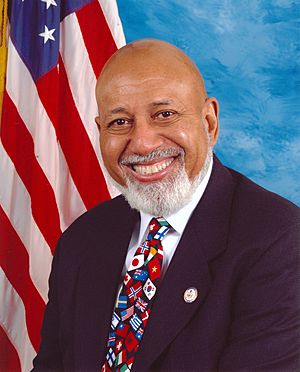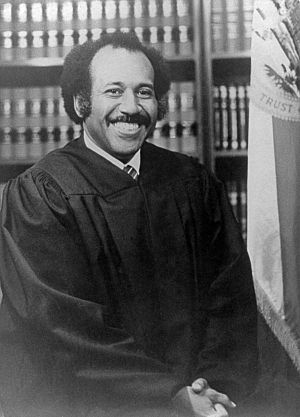Alcee Hastings facts for kids
Quick facts for kids
Alcee Hastings
|
|
|---|---|
 |
|
| Member of the U.S. House of Representatives from Florida |
|
| In office January 3, 1993 – April 6, 2021 |
|
| Preceded by | Constituency established |
| Succeeded by | Sheila Cherfilus-McCormick |
| Constituency | 23rd district (1993–2013) 20th district (2013–2021) |
| Judge of the United States District Court for the Southern District of Florida | |
| In office November 2, 1979 – October 20, 1989 |
|
| Appointed by | Jimmy Carter |
| Preceded by | Seat established |
| Succeeded by | Federico A. Moreno |
| Judge of the 17th Judicial Circuit Court of Florida | |
| In office May 2, 1977 – October 31, 1979 |
|
| Appointed by | Reubin Askew |
| Preceded by | Stewart LaMotte |
| Succeeded by | Harry Hinckley |
| Personal details | |
| Born |
Alcee Lamar Hastings
September 5, 1936 Altamonte Springs, Florida, U.S. |
| Died | April 6, 2021 (aged 84) Beverly Hills, California, U.S. |
| Political party | Democratic |
| Spouses | Twice divorced Patricia Williams
(m. 2019) |
| Children | 3 |
| Education | Fisk University (BA) Howard University Florida A&M University (JD) |
Alcee Lamar Hastings (/ˈælsiː/ AL-see; September 5, 1936 – April 6, 2021) was an American politician and judge from the state of Florida.
A Democrat, Hastings was first elected to the United States House of Representatives in 1992. He represented Florida's 23rd congressional district from 1993 to 2013 and represented Florida's 20th congressional district from 2013 until his death in 2021. The 20th district included most of the majority-black precincts in and around Fort Lauderdale and West Palm Beach. Following Senator Bill Nelson's departure from office in January 2019, Hastings became the dean of Florida's congressional delegation; he retained this title until his death.
Contents
Early life, education, and early career
Alcee Lamar Hastings was born in Altamonte Springs, Florida, the son of Mildred L. (Merritt) and Julius "J. C." Hastings. He was educated at Crooms Academy in Goldsboro (Sanford), Florida, before going on to attend Howard University in Washington, D.C. and Fisk University in Nashville, Tennessee. He earned his Bachelor of Arts degree in zoology and botany from Fisk in 1958. After being dismissed from Howard University School of Law, Hastings received his Juris Doctor from Florida A&M University College of Law in 1963. While in school, he became a member of the Kappa Alpha Psi fraternity. He was admitted to the bar in 1963, and began to practice law.
1970 U.S. Senate election
Hastings decided to run for the United States Senate in 1970 after incumbent Spessard Holland decided to retire. He failed to win the Democratic primary or make the runoff election, finishing fourth out of five candidates, with 13% of the vote. Former Governor Farris Bryant finished first with 33% of the vote. State Senator Lawton Chiles was second with 26%. Chiles defeated Bryant in the runoff election and won the November general election.
Judicial career (1977–1989)
In 1977, Hastings became a judge of the circuit court of Broward County, Florida. On August 28, 1979, President Jimmy Carter nominated Hastings to the United States District Court for the Southern District of Florida. He was confirmed by the United States Senate on October 31, 1979, and received his commission on November 2, 1979. Hastings was the first black federal judge in the history of the state of Florida. His service was terminated on October 20, 1989, due to impeachment and conviction.
Allegations and impeachment
Impeachment trial
The Judicial Conference of the United States investigated Hasting and brought its accusations, which it believed warranted an impeachment, to the United States House of Representatives.
In 1988, the Democratic-controlled House of Representatives took up the case, and Hastings was impeached for bribery and perjury by a vote of 413–3. He was then convicted in his impeachment trial before the United States Senate on October 20, 1989. At the time, the Senate was also controlled by a Democratic majority. Hastings became the sixth federal judge in the history of the United States to be removed from office by the Senate. The Senate, in two hours of roll calls, voted on 11 of the 17 articles of impeachment. He was removed from the bench, but the Senate did not preclude him from holding office in the future.
Appeal
Hastings filed suit in federal court claiming that his impeachment trial was invalid because he was tried by a Senate committee, not in front of the full Senate, and that he had been acquitted in a criminal trial. Judge Stanley Sporkin ruled in favor of Hastings, remanding the case to the Senate, but stayed his ruling pending the outcome of an appeal to the Supreme Court in a similar case regarding Judge Walter Nixon, who had also been impeached and removed.
The Supreme Court ruled in Nixon v. United States, again referring to Walter Nixon, that procedures for trying an impeached individual cannot be subject to review by the judiciary. Judge Sporkin changed his ruling accordingly, and Hastings's conviction and removal were upheld.
1990 Secretary of State election
Hastings attempted to make a political comeback by running for Secretary of State of Florida, campaigning on a platform of legalizing casinos. In a three-way Democratic primary, he placed second with 33% of the vote, behind newspaper columnist Jim Minter's 38% of the vote. In the runoff, which saw a large dropoff in turnout, Minter defeated Hastings, 67%–33%. Hastings won just one of Florida's 67 counties: Miami-Dade.
U.S. House of Representatives (1993–2021)
Elections
Hastings was elected to the United States House of Representatives in 1992, representing Florida's 23rd district. After placing second in the initial Democratic primary for the post, he scored an upset victory over state representative Lois J. Frankel in the runoff, and went on to easily win election in the heavily Democratic district. He did not face a serious challenge for reelection thereafter. Following redistricting, Hastings represented Florida's 20th district from January 2013 until his death. His death triggered a special election in 2022.
Tenure
Hastings was a member of the Congressional Black Caucus and was elected president of the Parliamentary Assembly of the Organization for Security and Co-operation in Europe in July 2004. As a senior Democratic whip, Hastings was an influential member of the Democratic leadership. He was also a member of the House Rules Committee. He was previously a senior member of the House Permanent Select Committee on Intelligence (HPSCI). On the HPSCI, Hastings was the chairman of the Subcommittee on Oversight and Investigations.
Hastings voted to impeach Texas federal judge Samuel B. Kent on all four counts presented against him on June 19, 2009.
On December 18, 2019, Hastings voted to impeach President Donald Trump. On January 13, 2021, he voted to impeach Trump for a second time.
Objection to the 2000 presidential election
Hastings and other members of the House of Representatives objected to counting the 25 electoral votes from Florida which George W. Bush narrowly won after a contentious recount. Because no senator joined his objection, the objection was dismissed by Vice President Al Gore, who was Bush's opponent in the 2000 presidential election.
Objection to the 2004 presidential election
Hastings was one of the 31 House Democrats who voted not to count the 20 electoral votes from Ohio in the 2004 presidential election, despite Republican President George W. Bush winning the state by 118,457 votes. Without Ohio's electoral votes, the election would have been decided by the U.S. House of Representatives, with each state having one vote in accordance with the Twelfth Amendment to the United States Constitution.
Bid for chairmanship of the House Intelligence Committee
After the 2006 United States House of Representatives elections, Hastings attracted attention after it was reported that incoming House Speaker Nancy Pelosi might appoint him as head of the House Permanent Select Committee on Intelligence. He had support from the Congressional Black Caucus but was opposed by the Blue Dog Coalition. Pelosi reportedly favored Hastings over the ranking Democrat, Jane Harman, due to policy differences and the Congressional Black Caucus's support. On November 28, 2006, Pelosi announced that Hastings would not be the committee's chairman, and she later chose Silvestre Reyes (D-TX). While Hastings was passed over to chair the committee, he became chair of a subcommittee. He told the National Journal, “I am not angry. At some point along the way, it became too much to explain. That is legitimate politics. But it’s unfortunate for me.”
Committee assignments
- Committee on Rules (Vice Chair)
- Subcommittee on Legislative and Budget Process
- Helsinki Commission (Chair)
Leadership positions
- Florida Congressional delegation (co-chairman)
- Senior Democratic whip
- Congressional Caucus on Global Road Safety (co-chairman)
- International Conservation Caucus
- Sportsmen's Caucus
Caucus memberships
- Congressional Arts Caucus
- Afterschool Caucuses
- Congressional NextGen 9-1-1 Caucus
- United States Congressional International Conservation Caucus
- Veterinary Medicine Caucus
- U.S.-Japan Caucus
- Medicare for All Caucus
- Blue Collar Caucus
Political positions
Foreign policy
Hastings opposed President Donald Trump's decision to recognize Jerusalem as Israel's capital. He stated: "I believe that Jerusalem is and should remain the undivided capital of Israel. To deny the Jewish connection to Jerusalem would be to deny world history. That being said, the manner in which the Trump Administration has announced its recognition of Jerusalem as the capital of Israel is of great concern."
Gun policy
Hastings said that gun control is a "critical element" in addressing the United States' crime problem. He favored reinstating the Federal Assault Weapons Ban and supported a federal ban on bump stocks. He supported raising the minimum age to buy a rifle from 18 to 21. In 2017, he voted against the Concealed Carry Reciprocity Act of 2017. His last rating from the NRA was an F, indicating that the organization believed that he did not support gun rights legislation.
Personal life and death
Hastings was married three times and had three children; his first two marriages ended in divorce. He married Patricia Williams in 2019, and they remained together until his death.
In January 2019, Hastings was diagnosed with pancreatic cancer, and he died from the disease on April 6, 2021, at the age of 84.
See also
 In Spanish: Alcee Hastings para niños
In Spanish: Alcee Hastings para niños
- List of African-American United States representatives
- List of United States Congress members who died in office (2000–)


